- Home
- Clive Barker
Galilee Page 2
Galilee Read online
Page 2
Please feel free to make of these claims what you will, by the way. Though my father has been dead almost a hundred and forty years, I’m not about to call him a liar in print. Such men as my father do not take kindly to having their stories questioned, and though he is deceased I do not entirely believe I am beyond his reach.
Anyway, it is a fine room. Obliged as I am to sit here most of the day I have become familiar with every nuance of its form and volume, and were Jefferson standing before me now I would tell him: sir, I can think of no happier prison than this; nor any more likely to inspire my slovenly mind to fly.
If I am so very happy here, sitting with a book in my hands, why, you may ask, have I decided to put pen to paper and write what will be inevitably a tragic history? Why torment myself this way, when I could wheel myself out onto the balcony and sit with a copy of St. Thomas Aquinas in my lap and watch life in the mimosas?
There are two reasons. The first is my half-sister Marietta.
It happened like this. About two weeks ago she came into my room (without knocking, as usual), partook of a glass of gin, without asking, as usual, and sitting down without invitation in what used to be my father’s chair said: “Eddie . . .”
She knows I hate to be called Eddie. My full name’s Edmund Maddox Barbarossa. Edmund is fine; Maddox is fine; I was even called The Ox in my younger day, and didn’t find it offensive. But Eddie? An Eddie can walk. An Eddie can make love. I’m no Eddie.
“Why do you always do that?” I asked her.
She sat back in the creaking chair and smiled mischievously, “Because it annoys you,” she replied. A typically Mariettaesque response, I may say. She can be the very soul of perversity, though to look at her you’d never think it. I won’t dote on her here (she gets far too much of that from her girlfriends), but she is a beautiful woman, by any measure. When she smiles, it’s my father’s smile; the sheer appetite in it, that’s an echo of him. In repose, she’s Cesaria’s daughter; lazy-lidded and full of quiet certitude, her gaze, if it rests on you for more than a moment, like a physical thing. She’s not a tall creature, my Marietta—a little over five feet without her boots—and now the immensity of chair she was sitting in, and the silly-sweet smile on her face, diminished her almost to a child. It wasn’t hard to imagine my father behind her, his huge arms wrapped around her, rocking her. Perhaps she imagined it too, sitting there. Perhaps it was that memory that made her say:
“Do you feel sad these days? I mean, especially sad?”
“What do you mean: especially sad?”
“Well I know how you brood in here—”
“I don’t brood.”
“You shut yourself away.”
“It’s by choice. I’m not unhappy.”
“Honestly?”
“I’ve got all I need here. My books. My music. Even if I’m desperate, I’ve got a television. I even know how to switch it on.”
“So you don’t feel sad? Ever?”
As she was pressing me so hard on the subject, I gave it a few more moments of thought. “Actually, I suppose I have had one or two bouts of melancholy recently,” I conceded. “Nothing I couldn’t shake off, but—”
“I hate this gin.”
“It’s English.”
“It’s bitter. Why do you have to have English gin? The sun went down on the Empire a long time ago.”
“I like the bitterness.”
She pulled a face. “Next time I’m in Charleston I’m going to bring you some really nice brandy,” she said.
“Brandy’s overrated,” I remarked.
“It’s good if you dissolve a little cocaine in it. Have you ever tried that? That gives it a nice kick.”
“Cocaine dissolved in brandy?”
“It goes down so smoothly, and you don’t get a nose filled with gray boogers the next morning.”
“I don’t have any need for cocaine, Marietta. I get along quite well with my gin.”
“But liquor makes you sleepy.”
“So?”
“So you won’t be able to afford so much sleepiness, once you get to work.”
“Am I missing something here?” I asked her.
She got up, and despite her contempt for my English gin, refilled her glass and came to stand behind my chair. “May I wheel you out onto the balcony?”
“I wish you’d get to the point.”
“I thought you Englishmen liked prevarication?” she said, easing me out from in front of my desk and taking me around it to the French windows. They were already wide open—I’d been sitting enjoying the fragrance of the evening air when Marietta entered. She took me out onto the balcony.
“Do you miss England?” she asked me.
“This is the most peculiar conversation . . .” I said.
“It’s a simple question. You must miss it sometimes.”
(My mother, I should explain, was English; one of my father’s many mistresses.)
“It’s a very long time since I was in England. I only really remember it in my dreams.”
“Do you write the dreams down?”
“Oh . . .” I said. “Now I get it. We’re back to the book.”
“It’s time, Maddox,” she said, with a greater gravity than I could recall her displaying in a long while. “We don’t have very much time left.”
“According to whom?”
“Oh for God’s sake, use your eyes. Something’s changing, Eddie. It’s subtle, but it’s everywhere. It’s in the bricks. It’s in the flowers. It’s in the ground. I went walking near the stables, where we put Papa, and I swear I felt the earth shaking.”
“You’re not supposed to go there.”
“Don’t change the subject. You are so good at that, especially when you’re trying to avoid your responsibility.”
“Since when was it—”
“You’re the only one in the family who can write all this down, Eddie. You’ve got all the journals here, all the diaries. You still get letters from you-know-who.”
“Three in the last forty years. It’s scarcely a thriving correspondence. And for God’s sake, Marietta, use his name.”
“Why should I? I hate the little bastard.”
“That’s the one thing he certainly isn’t, Marietta. Now why don’t you just drink your gin and leave me alone?”
“Are you telling me no, Eddie?”
“You don’t hear that very often, do you?”
“Eddie . . . ” she simpered.
“Marietta. Darling. I’m not going to throw my life into turmoil because you want me to write a family history.”
She gave me a sharp little look and downed her gin in one throatful, setting the glass on the balcony railing. I could tell by the precision of this motion, and her pause before she spoke, that she had an exit line in readiness. She has a fine theatrical flair, my Marietta.
“You don’t want to throw your life into turmoil? Don’t be so perfectly pathetic. You don’t have a life, Eddie. That’s why you’ve got to write this book. If you don’t, you’re going to die without having done a damn thing.”
III
i
She knew better of course. I’ve lived, damn her! Before my injury I had almost as great an appetite for experience as Nicodemus. I take that back. I was never as interested in the sexual opportunities afforded by my travel as he was. He knew all the great bordellos of Europe intimately; I preferred to wander the cathedrals or drink myself into a stupor in a bar. Drink is a weakness of mine, no question, and it’s got me into trouble more than once. It’s made me fat too. It’s hard, of course, to stay thin when you’re in a wheelchair. Your backside gets big, your waistline spreads; and Lord, my face, which used to be so well made I could walk into any gathering and take my pick of the female company, is now pasty and round. Only in my eyes might you glimpse the magnetism I once exercised. They are a peculiar color: mingled flecks of blue and gray. The rest of me’s just gone to hell.
I suppose that happens to everybody sooner or
later. Even Marietta, who is a pure-blooded Barbarossa, has said that over the years she’s noticed some subtle signs of aging; it’s just much, much slower than it would be for a human being. One gray hair every decade or so isn’t anything to bitch about, I remind her, especially when nature had given her so much else: she has Cesaria’s flawless skin (though neither she nor Zabrina are quite as black as their mother) and Nicodemus’s physical ease. She also shares my delight in getting drunk, but as yet it’s taken no toll on her waist or her buttocks. I digress; again. How did I get onto the subject of Marietta’s backside? Oh yes, I was talking about how I traveled as my father’s envoy. It was wonderful. I stood in the shit in a lot of stables over the years, of course, but I also visited some of this planet’s glories: the wilds of Mongolia, the deserts of North Africa, the plains of Andalusia. So please understand that though I’m now reduced to being a voyeur, this wasn’t always the case. I don’t write as a theorist, pontificating on the state of a world that I only knew from my newspapers and my television screen.
As I get deeper into the story I’ll no doubt season it with talk of the sights I saw and the people I knew on my journeys. For now, let me just talk of England, the country where I was conceived. My birth mother was a woman by the name of Moira Feeney, and, though she died a short time after my birth, of a sickness I’ve never quite comprehended, I passed the first seven years of my life in her native country, looked after by her sister, Gisela. It was not by any means a cosseted existence; Gisela was enraged when she discovered the father of her sister’s child did not intend to bring us into his charmed circle, and rather than accept the substantial sums he offered her to help raise me, she proudly, and foolishly, refused all subsidy. She also refused to see him. It wasn’t until Gisela also died (she was struck, somewhat suspiciously, by lightning) that my father appeared in my life, and took me with him on his travels. In the next five years we lived in a number of extraordinary houses, the guests of great men who wanted my father’s advice as a horse breeder (and Lord knows what else besides; I think he was probably shaping the destinies of nations behind the scenes). But for all the glamour of those years—two summers in Granada, a spring in Venice; so much more that I can’t recall—it is my years in Blackheath with Gisela that I still return to most fondly. Gentle seasons these; and my gentle human aunt, and milk and rain and the plum tree at the back of the cottage, from the topmost branches of which I could see the dome of St. Paul’s.
I have a pristine memory of what it was like to perch in those gnarled branches, where I would linger for hour upon hour, lulled into a happy trance by rhymes and songs. One of those rhymes I remember to this day.
It seems I am,
It seems I was,
It seems I will
Be born, because
It seems I am,
It seems I was,
It seems I will
Be born because—
And so on, round and round.
Marietta’s right, I do miss England, and I do what I can to keep remembrance of it. English gin, English syntax, English melancholy. But the England I yearn for, the England I dream of when I doze in my chair, no longer exists. It was just a view from a plum tree, and a happy child. Both went into history a long time ago. It is, however, the second reason why I am writing this book. In opening the floodgates of memory, I hope to be carried, at least for a little while, back into the bliss of my childhood.
ii
I should tell you, just briefly, about what happened the day I told Marietta I’d begun this book, because you’ll understand better what it’s like to live in this house. I had been sitting on my balcony with the birds (there are eleven individuals—cardinals, buntings, soldier-wing blackbirds—who come to feed from my hand and then stay to make music for me), and while I was feeding them I heard her down below having a furious argument with my other half-sister, Zabrina. As far as I could gather Marietta was being her usual imperious self, and Zabrina—who keeps out of everybody’s way most of the time, and when she does encounter one of the family doesn’t say much—was for once standing up for her own opinions. The gist of the exchange was this: Marietta had apparently brought one of her lovers into the house the previous night, and the visitor had proved to be quite the detective. Apparently she’d got up while Marietta was asleep, had gone wandering around the house and seen something she should not have seen.
Now she was apparently in a state of panic, and Marietta was quite out of patience with her, so she was trying to cajole Zabrina into cooking up some spiked candy that would wipe the woman’s memory clean. Then Marietta could take her back home, and the whole untidy business could be forgotten.
“I told you last time I don’t approve—” Zabrina’s voice is normally reedy and thin; now it was positively shrill.
“Oh Lord,” said Marietta wearily. “Don’t be so high-handed.”
“You know you should keep ordinary folks away from the house,” Zabrina went on; “It’s asking for trouble, bringing somebody here.”
“This one’s special,” Marietta said.
“So why do you want me to wipe her memory?”
“Because I’m afraid she’s going to lose her mind if you don’t.”
“What did she see?”
There was a pause. “I don’t know,” Marietta finally admitted. “She’s too incoherent to tell me.”
“Well where did you find her?”
“On the stairs.”
“She didn’t see Mama?”
“No, Zabrina. She didn’t see Mama. If she’d seen Mama—”
“She’d be dead.”
“—she’d be dead.”
There was a pause. Finally Zabrina said: “If I do this—”
“Yes?”
“Quid pro quo.”
“That’s not very sisterly,” Marietta groused. “But all right. Quid pro quo. What do you want?”
“I don’t know yet,” Zabrina said. “But I’ll think of something, don’t worry. And you won’t like it. I’ll make sure of that.”
“How very petty of you,” Marietta observed.
“Look. Do you want me to do it or don’t you?”
Again there was a pause. “She’s in my bedroom,” Marietta said. “I had to tie her to the bed.”
Zabrina giggled.
“It’s not funny.”
“They’re all funny,” Zabrina replied. “Weak heads, weak hearts. You’re never going to find anyone who can really be with you. You know that don’t you? It’s impossible. We’re on our own, to the very end.”
About an hour later Marietta appeared in my room. She looked ashen; her gray eyes full of sadness.
“You heard the conversation,” she said. I didn’t bother to reply. “Sometimes that bitch makes me want to hit her. Hard. Not that she’d feel it. Fat cow.”
“You just can’t bear to be in anybody’s debt.”
“I wouldn’t mind with you,” she said.
“I don’t count.”
“No, I guess you don’t,” she replied. Then, seeing the expression on my face. “Now what have I said? I’m just agreeing with you, for God’s sake! Why is everybody so damn sensitive around here?” She went to my desk and examined the contents of the gin bottle. There was barely a shot remaining. “Got any more?”
“There’s half a case in the closet in the bedroom.”
“Mind if I—?”
“Help yourself.”
“You know we should talk more often, Eddie,” she called back to me while she dug for the gin. “Get to know one another. I don’t have anything in common with Dwight and Zabrina’s been in the foulest mood for the last couple of months. She’s so obese these days, Eddie. Have you seen her? I mean, she’s grossly fat.”
Though both Zabrina and Marietta insist that they’re completely unlike—and in many regards this is true—they have some essential qualities in common. At their cores they’re both willful, stubborn, obsessive women. But whereas Marietta, who’s eleven years Zabrina’s j
unior, has always prided herself on her athleticism, and is as lean as a woman can get and still have a lushness about her body, Zabrina gave into her cravings for praline brittle and pecan pie years ago. Occasionally I’ll see her from my window, wandering rotundly across the lawn. At the last sighting she was probably three hundred and fifty pounds. (We are, you’ve doubtless begun to grasp, a profoundly wounded group of people. But trust me, when you better know the circumstances of our lives, you’ll be astonished we’re as functional as we are.)
Marietta had emerged with a fresh bottle of gin, and, unscrewing the top, poured herself an ample measure.
“Why do you keep all those clothes in the closet?” she said, knocking back a mouthful. “You’re never going to wear most of them.”
“I presume that means you have your eye on something.”
“The smoking jacket.”
“Take it.”
She leaned forward and kissed my cheek. “I’ve underrated you all these years,” she said, and went back into the bedroom to fetch the jacket in case I changed my mind.
“I’ve decided to write the book,” I told her when she emerged.
She tossed the jacket at Nicodemus’s chair and fairly danced with excitement. “That’s so wonderful,” she said. “Oh my God, Eddie, we’re going to have such fun.”
“We?”
“Yes, we. I mean, you’ll be writing it most of the time, but I’ll be helping. There’s a lot you don’t know. Dirt about Cesaria that she told me when I was little.”
“Maybe you should keep your voice down.”
“She can’t hear me. She’s always in her chambers these days.”

 The Great and Secret Show
The Great and Secret Show Coldheart Canyon: A Hollywood Ghost Story
Coldheart Canyon: A Hollywood Ghost Story Galilee
Galilee Cabal
Cabal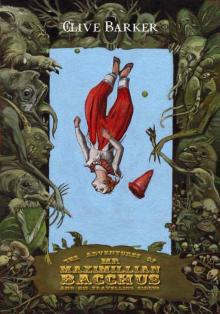 The Adventures of Mr. Maximillian Bacchus and His Travelling Circus
The Adventures of Mr. Maximillian Bacchus and His Travelling Circus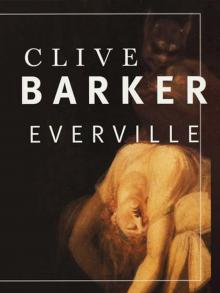 Everville
Everville Books of Blood: Volume Three
Books of Blood: Volume Three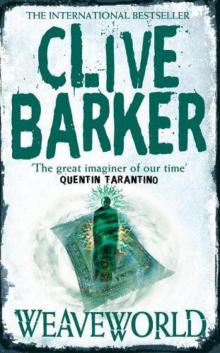 Weaveworld
Weaveworld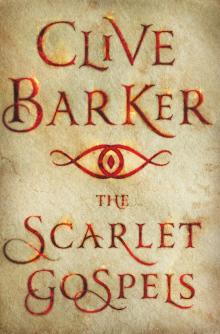 The Scarlet Gospels
The Scarlet Gospels Sacrament
Sacrament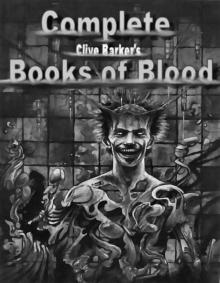 Books of Blood: Volumes 1-6
Books of Blood: Volumes 1-6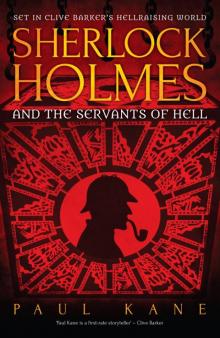 Sherlock Holmes and the Servants of Hell
Sherlock Holmes and the Servants of Hell Mister B. Gone
Mister B. Gone Imajica
Imajica The Reconciliation
The Reconciliation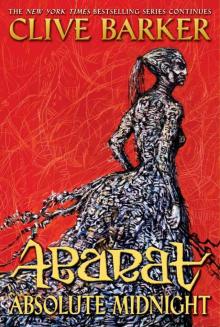 Abarat
Abarat Clive Barker's First Tales
Clive Barker's First Tales The Hellbound Heart
The Hellbound Heart The Inhuman Condition
The Inhuman Condition Infernal Parade
Infernal Parade Days of Magic, Nights of War
Days of Magic, Nights of War The Thief of Always
The Thief of Always Books of Blood Vol 2
Books of Blood Vol 2 The Essential Clive Barker
The Essential Clive Barker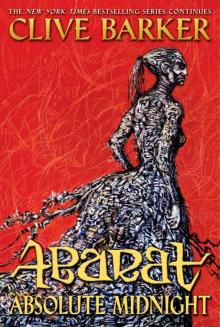 Abarat: Absolute Midnight a-3
Abarat: Absolute Midnight a-3 The Damnation Game
The Damnation Game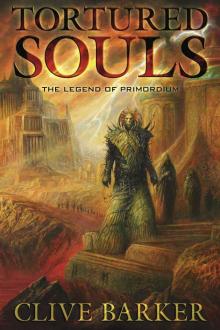 Tortured Souls: The Legend of Primordium
Tortured Souls: The Legend of Primordium Books of Blood Vol 5
Books of Blood Vol 5 Imajica 02 - The Reconciliator
Imajica 02 - The Reconciliator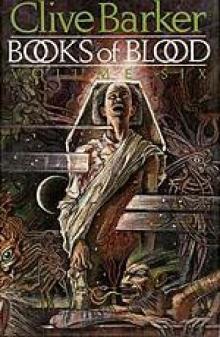 Books Of Blood Vol 6
Books Of Blood Vol 6 Imajica 01 - The Fifth Dominion
Imajica 01 - The Fifth Dominion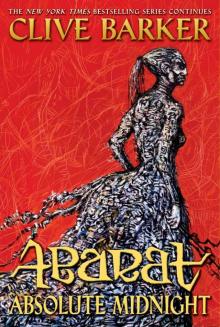 Abarat: Absolute Midnight
Abarat: Absolute Midnight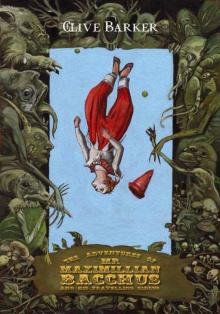 The Adventures of Mr. Maximillian Bacchus & His Traveling Circus
The Adventures of Mr. Maximillian Bacchus & His Traveling Circus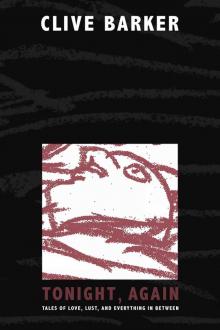 Tonight, Again
Tonight, Again Abarat: The First Book of Hours a-1
Abarat: The First Book of Hours a-1 Books Of Blood Vol 1
Books Of Blood Vol 1 Age of Desire
Age of Desire Imajica: Annotated Edition
Imajica: Annotated Edition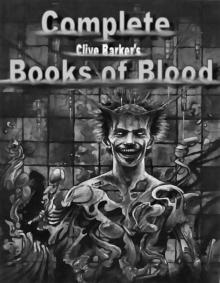 Complete Books of Blood
Complete Books of Blood Gutted: Beautiful Horror Stories
Gutted: Beautiful Horror Stories Shivers 7
Shivers 7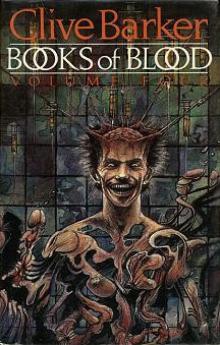 Books Of Blood Vol 4
Books Of Blood Vol 4